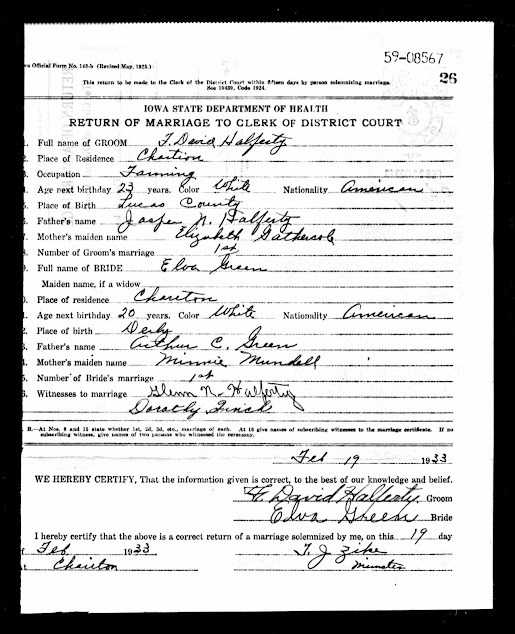Back in late winter 1931, the Iowa Legislature was among six state assemblies nationwide --- and among 16 attempting the leap --- that jumped aboard a "five-day marriage law" bandwagon. The laws were identical and directed county clerks to wait five days after couples filed applications for marriage licenses before issuing them.
Preachers and denominational assemblies were enthusiastic backers of the legislation as were many women's organization. Before the law, couples who wished to marry in Iowa and elsewhere could apply for and receive a license during one visit to the clerk's office, then marry --- sometimes just down the hall in the office of a justice of the peace.
Backers said they hoped that the new law would prevent hasty marriages (moderating the need for repentance at leisure), perhaps prevent undesirable people from marrying at all and even --- dabbling in eugenics --- prevent the birth of undesirable children who might result from the hasty union of undesirable people.
Iowa was joined in approving and implementing the five-day law by Minnesota, Idaho, Colorado, Ohio and Wyoming. Ten states declined to adopt the legislation. --- including neighboring Nebraska and South Dakota. Waiting periods had not been considered in either Illinois or Missouri.
Although inconvenienced by the law, which went into effect on July 4, 1931, Iowans who wished to marry in haste in most of the state just crossed a state line to do so after that. Bethany, Missouri, was a popular destination for Lucas Countyans, including a few relatives of mine, and quite a little industry developed there.
+++
But during late February of 1933, some 17 months after implementation of the five-day law, Francis David Halferty, age 23, and Elva Green, 20, both of Chariton, wished to marry in haste and didn't want to drive into Missouri to do so. So they took advantage of a clause that allowed an "emergency" wedding license to be issued if a judge agreed to waive the waiting period. They were the first and, so far as I know, the last Lucas County couple to do so.
A story on Page 1 of The Chariton Leader of Feb. 23 explains the circumstances:
Lucas county's first "emergency" wedding license was issued Saturday to F. David Halferty, 22, and Elva Green, 19, of Chariton, by Clerk G. C. Burgstrum.
Halferty is the first prospective bridegroom in this county since the introduction of the five day marriage law to be married without waiting for the legal interval of time to pass.
Judge Wennerstrum Saturday issued an order under the provision of the "public policy" clause in the law, asking that the license be issued at once, upon Halferty's plea that he had a promise of immediate employment in the event that he was married. The plea was presented to the court by J. H. Hickman, local attorney.
According to officials in the clerk's office, the youth was to begin work on a farm, but qualifications for the job included a wife. They were married Sunday by Rev. T.J. Zike of the United Brethren church.
The clause in the marriage law which allows immediate issuance of a license states that if the court of the county wherein the marriage is to be solemnized shall find that public policy required that the marriage be solemnized without delay he shall issue the license at once.
+++
Had the Halfertys' need to marry not been quite so pressing, they could have outwaited the law. The Iowa Legislature was preparing to repeal the five-day law --- even as vows were being exchanged. As of March 24, 1933, the five day waiting period was wiped from Iowa's list of rules and regulations.
There were several reasons. It had pained county clerks and others to see prospective newlyweds who might as well have been spending their money in Iowa disappear across a state line. The howls had been especially loud in Chickasaw County, home to Nashua and the Little Brown Church in the Vale, a popular wedding destination. Other lawmakers saw the waiting period as legislative overreach.
+++
David and Elva raised their family their family of four in Lucas County where he worked for the most part as a carpenter and building contractor. Their marriage endured for nearly 50 years --- until his death at age 71 on Sept. 2, 1982. Elva died on Oct. 26, 1991.
+++
The marriage timeline in Iowa remained unrestrained until 1961 when North Iowa lawmakers were goaded by their Minnesota neighbors, where a five-day waiting period had remained in place, into pushing for a three-day waiting period, imposed during the legislative session that year and effective July 4. Iowa was nothing more than a marriage mill, Minnesota officials said, expressing fear that impoverished residents were rushing into Iowa to marry and then returning to Minnesota to collect welfare benefits.
+++
As the years rolled on, many of those who might once have felt the urge to marry --- in haste or otherwise --- gradually lost the urge to marry at all. Iowa still has a three-day waiting period, but few voices of complaint are heard.


No comments:
Post a Comment